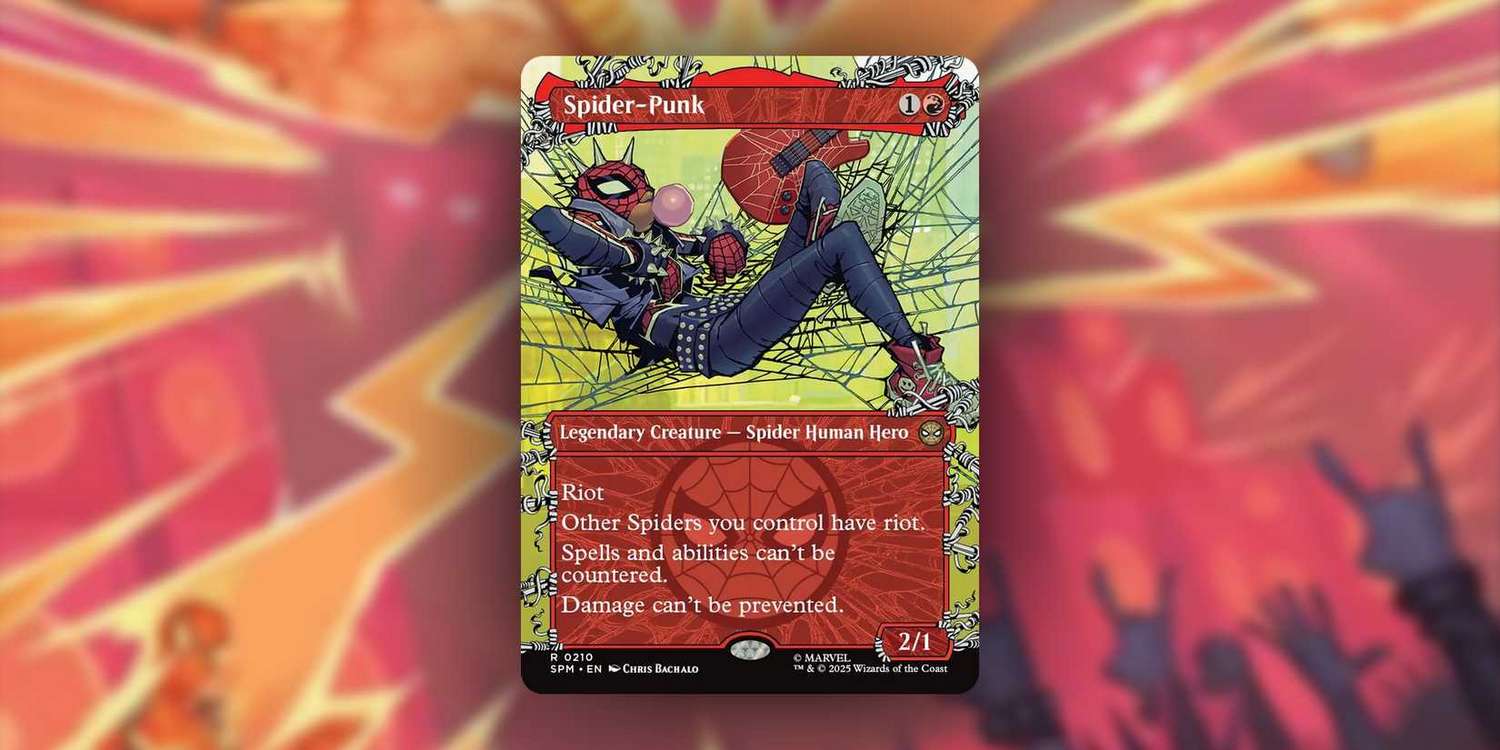Wizards of the Coast Survey Sparks Controversy Amidst Magic: The Gathering – Marvel’s Spider-Man Set Backlash: A Deep Dive
Popular Now
 Rust
Rust
 Auto X Drift Racing 3
Auto X Drift Racing 3
 Valorant
Valorant
 Toca Boca World
Toca Boca World
 Geometry Dash
Geometry Dash
 God of War Ragnarök
God of War Ragnarök
 BeamNG.drive
BeamNG.drive
 League of Legends
League of Legends
 Genshin Impact
Genshin Impact
 Among Us
Among Us  The highly anticipated, yet heavily criticized, release of the Magic: The Gathering | Marvel’s Spider-Man set under the Universes Beyond banner has prompted a significant response from publisher Wizards of the Coast (WotC). In a move designed to gauge player sentiment and understand the set’s lukewarm reception, WotC recently distributed a comprehensive player survey. However, the survey itself has become a new flashpoint of controversy, with a particularly targeted question raising concerns about the publisher’s approach to community feedback and the role of gaming influencers in shaping public perception.
The highly anticipated, yet heavily criticized, release of the Magic: The Gathering | Marvel’s Spider-Man set under the Universes Beyond banner has prompted a significant response from publisher Wizards of the Coast (WotC). In a move designed to gauge player sentiment and understand the set’s lukewarm reception, WotC recently distributed a comprehensive player survey. However, the survey itself has become a new flashpoint of controversy, with a particularly targeted question raising concerns about the publisher’s approach to community feedback and the role of gaming influencers in shaping public perception.
The survey is a clear indication that WotC is acutely aware of the substantial backlash the Spider-Man set has faced. Player criticisms have spanned multiple facets of the product, including the set’s mechanical design, perceived low power level, thematic execution, and overall value proposition. Unlike some previous, overwhelmingly successful Universes Beyond products—such as the lauded Lord of the Rings: Tales of Middle-earth set—the Spider-Man release struggled to capture the enthusiasm of the core MTG player base, often being critiqued for feeling less impactful on competitive formats like Standard and failing to inspire widespread deck-building excitement.
The core of the recent controversy, which has set the trading card game community ablaze and fueled numerous gaming news segments, revolves around a specific question within the feedback mechanism. This particular query, reportedly shown to players who indicated they consumed content about the set, specifically asked respondents to what degree “negative influencer commentary” affected their decision to purchase or their overall perception of the product. This framing, which arguably shifts the focus away from internal product development issues, has been widely interpreted by critics and content creators alike as an attempt by WotC to externalize blame for the set’s poor performance.
Strong reactions from prominent MTG content creators and professional players were immediate. Many voiced their concern that the question implied a “witch hunt” against those who offered honest, critical game reviews of the set. The sentiment is that a product’s success or failure should ultimately be tied to its intrinsic quality—its design, mechanics, flavor, and financial viability—rather than the opinions of third-party commentators. This situation highlights a complex, ongoing tension in the gaming industry: the balance between fostering a vibrant community of content creators and managing the impact of their critical analyses on commercial performance.
 The Catch: Scrutinizing the Blame Game in Modern TCG Marketing
The Catch: Scrutinizing the Blame Game in Modern TCG Marketing
While gathering data on marketing effectiveness and the influence of word-of-mouth is standard practice in the TCG space, the decision to specifically focus on negative commentary has raised ethical questions. The catch, as many in the community point out, is that this targeted line of questioning may prevent WotC from receiving truly candid feedback on the product’s foundational flaws. If the survey’s ultimate goal is to improve future Universes Beyond sets, critics argue that a deeper inquiry into the set’s mechanics—such as the perceived uninspired nature of its new keyword mechanics, the lack of compelling chase cards, or the aesthetic clash with the traditional Magic Multiverse—would be far more constructive than investigating external critiques.
For players, the principal issues with the Spider-Man set were tangible. Many felt the set was released in a state that reflected a rushed development cycle or a mandate to meet a pre-determined release window, leading to a perceived lack of polish. For example, some cards were considered functionally redundant or overly niche, failing to achieve the synergistic excellence that marks a successful MTG limited environment or a impactful Standard Format addition. The set’s financial performance, with some anecdotal reports of Collector Booster box prices dropping significantly post-release, further corroborated the community’s lack of widespread investment and enthusiasm.
The irony here is palpable: a company seeking to engage its audience through a dedicated feedback channel has inadvertently alienated a significant portion of its dedicated content creators—the very people who serve as the most effective, authentic marketing arm for any Trading Card Game. This strategic misstep in the survey design risks creating a chilling effect, where influencers might self-censor future game reviews to avoid perceived corporate scrutiny, ultimately harming the transparency and honesty that players rely on for informed purchase decisions. A crucial takeaway from this debacle is that the relationship between publisher and content creator must be one of mutual respect, acknowledging that constructive criticism is essential for the long-term health and improvement of the product.
 Looking Ahead: The Future of Universes Beyond and High-Value Data
Looking Ahead: The Future of Universes Beyond and High-Value Data
Despite the current friction, the Universes Beyond initiative remains a cornerstone of WotC’s forward strategy, bringing new players and substantial revenue to the Magic The Gathering ecosystem. With announced partnerships for properties like Teenage Mutant Ninja Turtles and various PlayStation franchises, the crossover sets are not going away. Therefore, the data gathered from this controversial survey, regardless of its flawed execution, holds immense potential value. WotC must extract the genuine, high-value information contained within the broader player responses—data concerning pricing tolerance, thematic preference, and mechanical reception—and treat it as an investment in the quality of their future products.
The key for WotC will be transparency and accountability. A formal acknowledgment of the question’s misstep, followed by a public commitment to focus on product quality and design excellence, could go a long way in repairing the damage. Moving forward, the gaming news cycle will be keenly watching for any discernible changes in the design philosophy of upcoming sets. Players and content creators want assurance that their feedback is driving better card design and more compelling gameplay, not serving as fodder for a corporate deflection strategy. The success of the next few Universes Beyond sets will ultimately serve as the most important and least ambiguous game review of WotC’s ability to adapt and listen to its core audience.
For players investing in these products, the lesson is clear: robust and collective feedback, focused on the quality and playability of the cards, is the most powerful tool for influencing the direction of the game. The market for MTG cards is a dynamic one, driven by passion, playability, and collectible value. Ensuring that future crossover sets deliver on all three fronts is the only guaranteed way to turn potential backlash into blockbuster success.









 The Catch: Scrutinizing the Blame Game in Modern TCG Marketing
The Catch: Scrutinizing the Blame Game in Modern TCG Marketing Looking Ahead: The Future of Universes Beyond and High-Value Data
Looking Ahead: The Future of Universes Beyond and High-Value Data